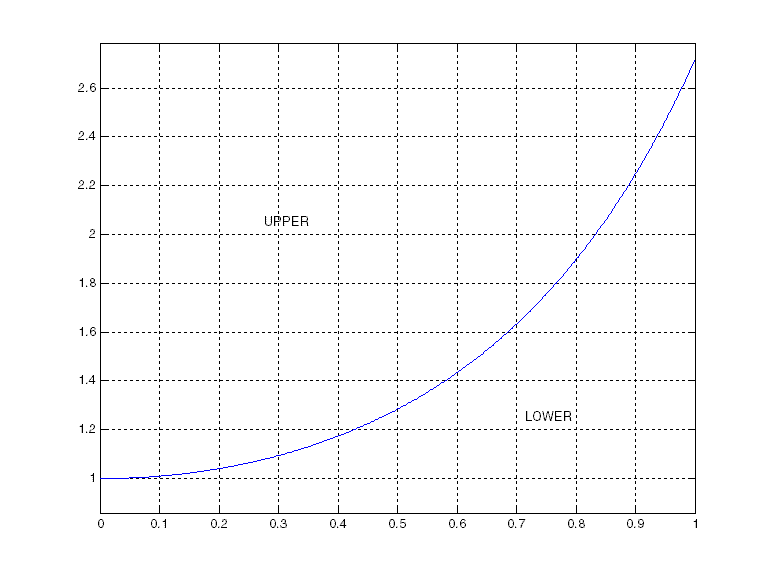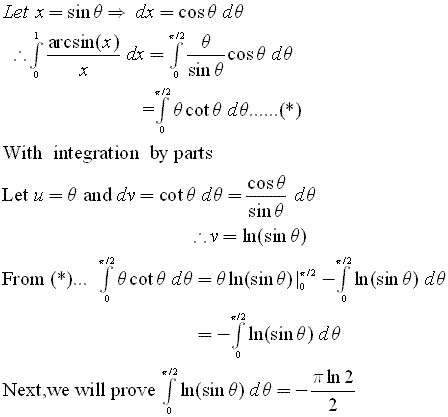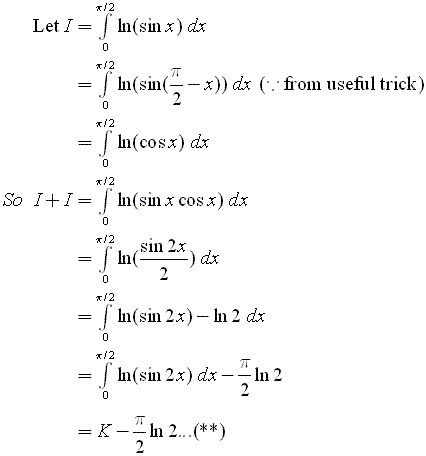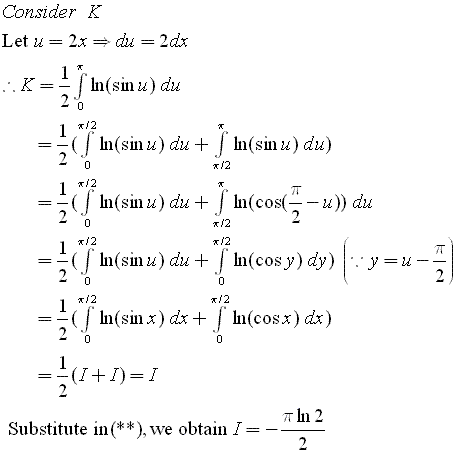
 |
ตะลุยโจทย์ Integrate
คือ ผมอยากได้โจทย์อินทิเกรตที่ไม่ยาก และง่ายเกินไปอะครับ
เช่นอินทิเกรตตรีโกณ หรือพวก exponential อะครับ ถ้าผมทำไม่ได้จริงๆ ช่วยสอน step by step ด้วยครับ ขอบคุณครับ :please: |
|
ผมอ่านแล้วมันไม่ได้ทำเองเลยอะครับ มีโจทย์แล้วก็เฉลยเลย
ยังไงก็ขอโจทย์แบบที่ยังไม่มีเฉลยก่อนด้วยนะครับ ขอบคุณครับ |
$$\int \frac{dx}{1+\sin x} $$
|
อา ก็แอบจดโจทย์มาก่อน อย่าเพิ่งไปมองเฉลยจิคับ
ถ้าแอบเห็นก่อนก็จดเสดแล้วรอให้ลืมแล้วค่อยกลับมาทำ ตัวอย่างใน บทความมีเยอะ เลย ไม่ต้องหาไกล เพิ่มเติมให้ต่อจากคุณ warut ครับ \[ \int \frac{e^x-e^{-x}}{e^x + e^{-x}} dx \] \[ \int \frac{1}{\sin x} dx \] \[ \int \sec^3 x \ dx \] ที่นี่ก็มีตัวอย่างพร้อมแบบฝึกหัดบ้างครับ |
ลองทำครับ
$$ \int \frac{e^x-e^{-x}}{e^x+e^{-x}}dx $$ ให้ $ u =e^x+e^{-x} $ $$ \frac{du}{dx}=e^x-e^{-x} $$ $$ \int \frac{du}{u}=\ln|u|+C $$ $$ \int \frac{e^x-e^{-x}}{e^x+e^{-x}} dx=\ln|e^x+e^{-x}|+C $$ :laugh: $$\begin{array}{rcl} \int \frac{dx}{1+\sin x}&=&\int\frac{1-\sin x}{1-\sin^2x}\ dx\\ &=&\int \frac{1-\sin x}{\cos^2x}\ dx\\ &=&\int \sec^2x\ dx -\int \tan x\sec x \ dx\\ &=&\tan x - \sec x+C \\ \therefore \int\frac{dx}{1+\sin x} &=&\tan x -\sec x +C\end{array}$$ $$\int \frac{dx}{\sin x} = \int \csc x\ dx=\ln|\csc x - \cot x|+c$$ |
Hint : use integration by part : \( \int u dv = uv - \int v du \)
Let : \( u =\sec x \; \text{and} \; dv=\sec^2 x \ dx\) |
ทำไม่ได้อะครับ
|
Let : \( u =\sec x \; \text{and} \; dv=\sec^2 x \ dx\)
then \( v=\int \sec^2 x \ dx = \tan x \) ทำการอินทิเกรตทีละส่วน \[ \begin{array}{rcl} \int \sec^3 x \ dx &= & \sec x \tan x - \int \tan x \ d(\sec x) \\ & = & \sec x \tan x - \int \tan^2 x \sec x \ dx \\ & = & \sec x \tan x - \int (1+ \tan^2 x) \sec x \ dx \\ & = & \sec x \tan x - \int \sec^3 x \ dx + \int \sec x \ dx \\ 2 \int \sec^3 x \ dx & = & \sec x \tan x - ln \mid \sec x +\tan x \mid + C \\ \int \sec^3 x \ dx & = & \frac{1}{2} \sec x \tan x - \frac{1}{2} \ln \mid \sec x +\tan x \mid + C \end{array} \] |
ขอบคุณมากครับ
อยากได้โจทย์ที่เป็นเทคนิคพิเศษ, ใช้บ่อยๆ หรือ ทำแล้วได้ข้อคิดอะครับ ท่านใดที่มีข้อเสนอแนะหรือเกร็ดความรู้ก็เชิญลงได้เลยครับ ขอบคุณครับ |
|
ช่วยแปะครับ
$\displaystyle{ \int_{0}^{\frac{\pi}{2}} \frac{\sin^3{x}}{\sin^3{x}+\cos^3{x}}}dx$ |
ของพี่ nooonuii ไม่มี hint ออกจะโหดไปหน่อยนะครับ ผมเพิ่มให้ละกัน
Hint : first show that \[ \int_0 ^{\frac{\pi}{2}} \frac{\sin^3 x}{\sin^3x +\cos^3 x} dx = \int_0 ^{\frac{\pi}{2}} \frac{\cos^3 x}{\sin^3x +\cos^3 x} dx \] and use this result to calculate \[ \int_0 ^{\frac{\pi}{2}} \frac{\sin^3 x}{\sin^3x +\cos^3 x} \] |
...
|
Hint เพิ่มเติม $\sin{(\frac{\pi}{2}-x)}=\cos{x}$ :D
|
เฉลยละกันนะคับ
เราแสดงได้ว่า \[ \int_0 ^{\frac{\pi}{2}} \frac{\sin^3 x}{\sin^3x +\cos^3 x} dx = \int_0 ^{\frac{\pi}{2}} \frac{\cos^3 x}{\sin^3x +\cos^3 x} dx \] ดังนั้น \[ \int_0 ^{\frac{\pi}{2}} \frac{\sin^3 x}{\sin^3x +\cos^3 x} dx + \int_0 ^{\frac{\pi}{2}} \frac{\cos^3 x}{\sin^3x +\cos^3 x} dx = 2 \int_0 ^{\frac{\pi}{2}} \frac{\sin^3 x}{\sin^3x +\cos^3 x} dx \] จะได้ว่า \[ \int_0 ^{\frac{\pi}{2}} \frac{\sin^3 x + \cos^3 x}{\sin^3x +\cos^3 x} dx = 2 \int_0 ^{\frac{\pi}{2}} \frac{\sin^3 x}{\sin^3x +\cos^3 x} dx \] ดังนั้น \[ \int_0 ^{\frac{\pi}{2}} \frac{\sin^3 x }{\sin^3x +\cos^3 x} dx = \frac{1}{2} \frac{\pi}{2} = \frac{\pi}{4} \] |
สำหรับ Hint ในส่วนของผม
ข้อแรกของผม กับคำถามของคุณ nooonuii ใช้หลักการเดียวกันครับ และเป็น useful trick มากสำหรับอินทิกรัลจำกัดเขตบางประเภท Trick ที่ว่าคือ $$ \int_{0}^{a} f(x) dx=\int_{0}^{a} f(a-x) dx $$ ซึ่งพิสูจน์ได้ไม่ยาก โดย ให้ $ u=a-x $ ส่วนข้อที่ 2 แนะนำให้ลองใช้ฟังก์ชันตรีโกณมิติ มาช่วยครับ :cool: |
อ้างอิง:
|
ช่วยใบ้ข้อ 2 ของคุณ passer-by: $\sec^2x=1+\tan^2x$
ข้อของคุณ nooonuii หากแสดงได้ว่าสองอินทิกรัลเท่ากัน อาจเขียนได้ว่า $\int\frac{\sin^3x}{\dots}\ dx=\int\ dx-\int\frac{\cos^3x}{\dots}\ dx$ แล้วทำต่อเหมือนคุณ M@gpie ก็ได้ครับ ไหนๆก็เข้ามาตอบแล้ว ขอแปะโจทย์เพิ่มอีกข้อ หวังว่าคนทำคงไม่บ้าไปซะก่อน :P $$\int_1^2 \sqrt[4]{2+\sqrt{2x-1}}\,dx$$ เอารากที่สี่ออกก่อน |
ลองทำนะครับ...
ให้ $\sqrt[4]{x} = \tan u $ $$\begin{array}{rcl}\int \frac{\tan u}{1+\tan^2u}\ d(\tan^4u)&=&\int\frac{\tan u}{ \sec^2u} d(\tan^4 u)\\ \because\quad d(\tan^4u)&=& 4\tan^3u\sec^2u \ du\\ ดังนั้น \quad \int \frac{\tan u}{\sec^2u}\ d(\tan^4u)&=&\int 4\tan^4u\ d u\\ \because\quad \int \tan^4u\ du&=&\int (\sec^2u-1)\tan^2u \ du \\ &=&\int\sec^2u\tan^2u\ du-\int\tan^2u \ du \\ &=&\int\tan^2u\ d(\tan u)-\int\sec^2u\ du+\int \ du\\ &=&\frac{\tan^3u}{3}-\tan u +u+C\\ \int 4\tan^4u\ du&=&4(\frac{\tan^3u}{3}-\tan u +u+C)\\ \because \ u&=&\arctan\sqrt[4]{x}\\ \int \frac{ \sqrt[4]{x}}{1+\sqrt x}&=&4\big(\frac{x^{3/4}}{3}-\sqrt[4]{x}+\arctan{\sqrt[4]{x}}\big)\\ \therefore \int_0^{16} \frac{ \sqrt[4]{x}}{1+\sqrt x}&=&4(\frac{8}{3}-2+\arctan 2)\\ &=&4(\frac{2}{3}+\arctan 2 ) \end{array}$$ กว่าจะได้ 1 ข้อ :wacko: Edit: แก้ขอบเขตครับ |
ถูกแล้วล่ะครับ น้อง Mastermander :great: แต่มี comment นิดเดียว ตรงการเขียนขอบเขตของ u กับ x อย่าเอามาปนกัน ก็จะดีนะครับ
งั้นแถมให้อีกข้อนึง (VTRMC 2005) Compute $ \int_{0}^{1} (e-1)\sqrt{ln(1+ex-x)}+e^{x^{2}} dx $ hint ให้นิดนึงว่า trick ที่ใช้ในข้อนี้ คล้ายๆกับ โจทย์บางข้อ เมื่อปลายปีที่แล้ว |
เนื่องจากโจทย์ของคุณ Passer-by ผมทำไม่ได้แน่นอน ผมจึงเอาไปถามในเว็บบอร์ดวิชาการแล้วได้ความมาว่า
 ซึ่งทำโดยคุณ GFK แล้วผมยัง งงๆอยู่ ตรงบรรทัดที่ ---** ทำไมขอบเขตเป็น 1 ถึง e ครับ |
1 และ e เป็นค่าของ u เมื่อ x=0 และ 1 ครับ
|
ก่อนจะเฉลยข้อที่แล้ว แบบไม่ใช้ by parts ขอแปะให้อีกข้อนะครับ คราวนี้ ง่ายกว่าสามข้อแรกของผมหลายเท่าตัว และคงจะเป็นข้อสุดท้ายของผมแล้ว เพราะไม่รู้จะถามอะไรต่อดี :sweat:
Compute $ \int_{0}^{\pi/2} \frac{\sin^{2}(x)}{(1+\cos x)^{2}}\, dx $ ส่วนข้อก่อนหน้านี้ ใช้หลักการเดียวกับ ข้อสอบสมาคม 2548 ข้อ34 คือมองฟังก์ชันเดียวกัน เป็น 2 มุมมอง จาก $ y= e^{x^{2}}$ ดังนั้น $ x= \sqrt {lny} $ ทำให้ $ \int_{0}^{1} e^{x^{2}} dx + \int_{1}^{e} \sqrt {lny} \, dy= \text{LOWER} +\text{UPPER}= (1)(e)=e $ (LOWER+ UPPER= พื้นที่สี่เหลี่ยมผืนผ้า)  |
$$\int_0^{\pi/2}\frac{\sin^2x}{(1+\cos x)^2}dx=\int_0^{\pi/2}\frac{4\sin^2\frac{x}{2}\cos^2\frac{x}{2}}{4\cos^4\frac{x}{2}}dx$$
$$\int_0^{\pi/2}\tan^2\frac{x}{2}\ dx = 2\int_0^{\pi/2}\sec^2\frac{x}{2}d(\frac{x}{2})-\int_0^{\pi/2}1\ dx$$ $$=[2\tan \frac{x}{2} - x]|_0^{\frac{\pi}{2}}=2-\frac{\pi}{2}$$ ถูกมั้ยครับ (อุตส่าห์ทำได้) |
ถูกแล้วล่ะครับ น้อง Mastermander :great:
แล้วอย่าลืม คำถามของคุณ nongtum ด้วยนะครับ ส่วนที่ผมบอกว่า ข้อที่แล้ว เป็นข้อสุดท้าย ถือเป็นโมฆะแล้วกันนะครับ เพราะลืมไปว่า ยังเหลือที่อยากถาม อีกข้อนึง (ไม่ถามล่ะเสียดายตายเลย) Compute $ \int_{0}^{1} \frac{\arcsin x}{x} dx $ ข้อนี้ จะเป็นข้อสุดท้ายของผม จริงๆแล้วล่ะครับ (Hint : ข้อนี้ ใช้ By parts มาช่วย ประกอบกับ useful trick ที่เคยให้ไป) P.S. อีก 3 วัน จะกลับมาดูความคืบหน้าข้อนี้นะครับ |
$$ \int_0^1 \frac{\arcsin x}{x}dx $$
Let $ x=\sin u$ $$\begin{array}{rcl}\int \frac{\arcsin x}{x}dx&=&\int \frac{u}{\sin u}d(\sin u)\\ &=&\int u (\cot u) du\\ &=&\text{what next}\end{array}$$ คือผมไปถามรุ่นพี่เอาแล้วได้ความมาว่า $\int \frac{\arcsin{x}}{x}dx=x $ ใช่หรือเปล่าครับ |
ยังไม่ได้ทดนะครับ แต่ลองอินทิเกรตแยกส่วนด้านบนดูนะครับ อ่าจต้องหา $\int\cot x\ dx$ มาเก็บไว้ก่อนด้วย
|
อ้างอิง:
ตอนนี้ ก็ครบ 3 วันแล้ว งั้นผมเฉลยแบบละเอียดๆ เลยนะ ส่วนที่ 1  ส่วนที่ 2  ส่วนที่ 3  |
ตัวปัญหาของผมคือ
$$ \int \ln(\sin x )\ dx=? $$ |
ตอนนี้ คำอธิบาย 3 ส่วนด้านบน สมบูรณ์ เรียบร้อยแล้วครับ
|
ให้ $u=\sqrt[4]{2+\sqrt{2x-1}}$ จะได้ $x=\frac{1}{2}((u^4-2)^2+1)$ และ $dx=4u^3(u^4-2)du$ ดังนั้น $$\begin{array}{rcl} \int_1^2\sqrt[4]{2+\sqrt{2x-1}}dx&=&\int_1^2 4u^4(u^4-2)du =(\frac{4}{9}u^9-\frac{8}{5}u^5)\big|_{x=1}^{x=2}\\ &=&\frac{4}{45}(2+\sqrt{2x-1})^{5/4}(-8+5\sqrt{2x-1})\big|_1^2\\ &=&\frac{4}{45}\bigg((2+\sqrt{3})^{1/4}(-1+2\sqrt{3})+9\cdot3^{1/4}\bigg)\\ \end{array}$$ |
็สงสัยว่า...
$$ \int_{\pi/2}^{\pi}\cos(\pi/2- u)\ du=\int_0^{\pi/2}\cos y \ dy $$ ทำไมขอบเขตเปลี่ยนไป |
ผมสงสัยนิดนึงว่า ตอนเราเปลี่ยนตัวแปร มันจะมีปัญหาที่ \( \theta = \frac{\pi}{2} \; \) รึเปล่าครับ
เพราะว่า มันจะทำให้ ฟังก์ชัน \( \ln( \sin ( \frac{\pi}{2}- \theta )) \) หาค่าไม่ได้ |
จริงๆแล้วมันมีปัญหาตั้งแต่ก่อนเปลี่ยนตัวแปรแล้วครับ ซึ่งก็คือที่ $\theta=0$ ทั้งนี้เพราะโจทย์ข้อนี้มันเป็น improper integral น่ะครับ ไม่รู้ตอบตรงประเด็นรึเปล่า :rolleyes:
ว่าแล้วก็แถมโจทย์ให้อีกข้อครับ $$\int x^n\ln x \,dx$$ โดยที่ $n$ เป็นจำนวนจริงบวก |
อ้างอิง:
เมื่อ u=p/2 ก็จะได้ y=0 และเมื่อ u= p ก็จะได้ y= p/2 P.S. สรุปว่า เรากำลัง จะสร้างกระทู้ integrate มาราธอน กันใช่มั้ยครับ :laugh: |
โจทย์ยากๆทั้งนั้นเลย
what is improper integral ?? มาราธอนเลยก็ดีครับ |
What is improper integral ?? ---> read this
|
คุณ warut ไม่มาเฉลยสักหน่อยหรอครับ
อยากได้โจทย์ by part ครับ เพิ่งเห็นสูตรของ $ \int \ln x \ dx $ ขอลองทำของคุณ warut ดูนะครับ Let u = ln x , dv = xn dx $$\begin{array}{rcl} \int x^n\ln x\ dx&=&\frac{x^{n+1}\ln x}{n+1}-\frac{1}{n+1}\int x^{n+1}d \ln x \\ &=&\displaystyle{\frac{x^{n+1}\ln x}{n+1} -\frac{\int x^n\,dx}{n+1}} \\ \int x^n\ln x\ dx&=&\displaystyle{ \frac{x^{n+1}\ln x}{n+1}-\frac{x^{n+1}}{(n+1)^2}+c }\end{array}$$ Edit : เปลี่ยน u ,v |
ถูกครับ แต่คำตอบยังสามารถ simplify ได้อีกหน่อยเป็น $$ \frac{x^{n+1}\ln x}{n+1}- \frac{x^{n+1}}{(n+1)^2} $$ และวิธีที่ใช้ก็ยังไม่ใช่วิธีที่ตรงไปตรงมาที่สุด ทำแบบ ความเห็นเพิ่มเติมที่ 107 ในกระทู้ที่ วิชาการ.คอม จะดีกว่าครับ
สำหรับสูตรของ $\int\ln x\,dx$ หาได้โดยใช้ integration by parts (ต้องมี s เสมอนะครับ) ดังนี้ $$\int\ln x\,dx= x\ln x-\int x\,d(\ln x)= x\ln x-\int1\,dx= x\ln x-x+C $$ |
| เวลาที่แสดงทั้งหมด เป็นเวลาที่ประเทศไทย (GMT +7) ขณะนี้เป็นเวลา 07:13 |
Powered by vBulletin® Copyright ©2000 - 2024, Jelsoft Enterprises Ltd.
Modified by Jetsada Karnpracha